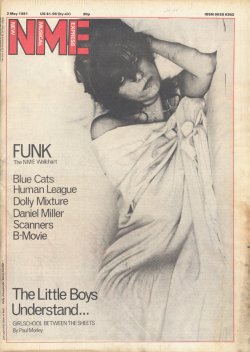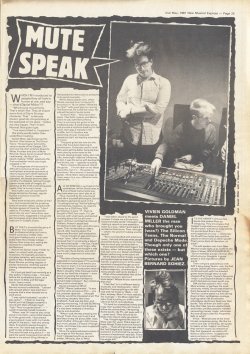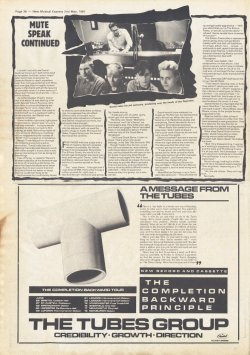Mute Speak
[NME, 2nd May 1981. Words: Vivien Goldman. Pictures: Jean Bernard Sohiez.]
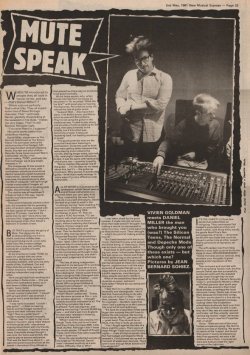
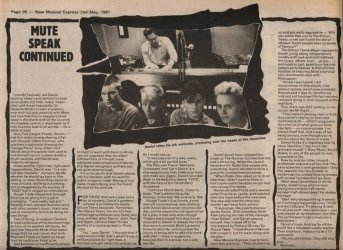
MUTE SPEAK
“When I’m introduced to people they all look in horror at me, and say – that’s Daniel Miller?!?
“Which suits me perfectly. That’s what I like. They all expect some kind of Steve Strange character. That,” continues Daniel, gleefully chopsticking at the seaweed on his plate, “makes me very happy. That I’m still Normal. Not quite right.
“I’ve never fitted in, I suppose.”
His smile works better than underfloor heating.
Daniel Miller, also known as The Normal. Also known as The Silicon Teens. The earmaster behind the various works of Fad Gadget, DAF, and now the chart-enterers Depeche Mode. Founder and pilot of Mute Records. Grace Jones covered his “Warm Leatherette”, the flip of his epoch-making “TVOD”, positively the first synthesiser weird pop single, released in ’77.
The strangeness of that sound is difficult to conceive of now, with synthesisers almost as common as electric typewriters (both keyboard instruments). Daniel’s newscaster evenness, the accent plummy after months of yobspeak, rattling through a terse morse code of images, all ominous as the froth on bursting pods (really, they’re human clones…).
The rhythm was all machines! If things carried on this way, regular human musicians would be redundant!
They were to become clichés in their turn, but moments like the growing entry of random radios, coupled with the teen-appeal of lines like “I don’t need no TV screen, I just stick the aerial into my vein” were shiny new currency then [1], suggested a marginally less bourgeois origin than Daniel’s bedroom in Golder’s Green.
But that is precisely the glory of Mute. The incongruity of a professional drop-out from a media-conscious middle-class immigrant background, a man who looks more like a messy college lecturer than a pop star, setting the controls for a swathe of svelte synthesisers.
At the time Daniel made “TVOD” he wasn’t in contact with any other musicians. He basically worked in complete isolation, with only the early works of Neu, Kraftwerk, Can and Klaus Schulze pointing vaguely in similar directions. And they weren’t making independent pop singles, either.
He’d just got back from working as a disc jockey in Swiss clubs – this was before the synthadisco boom, so it was down to Abba and Schlager music; heavy metal.
Daniel had already scored some Normal musical credentials; “I played with groups when I was at school. I suppose that’s what decided me to work alone.
“I was really frustrated. I couldn’t play guitar” – I flash on hearing Daniel and Fad Gadget condemn a record with their ultimate insult: “Ugh! They’re a guitar band!” – “I couldn’t express myself musically.
“When I was 14 I used to play noise alone in my room, using metal objects to hit the guitar with. I was always arguing about music with my friends, people in the band. I had very strong ideas. Everybody always thought I was nuts. Our band was terrible. We used to play at dances and parties. That was the best thing about it – we were the worst musicians from all the bands in the school (King Alfred’s in Hampstead) so there was no pressure to be good musically…”
Which helps explain why, when Daniel returned from his Swiss DJ excursion in ’76, he yelled “What the fux this?” with great glee on hearing The Ramones. He loved the noise. He adored the lack of guitar solos.
“Guitars? Well… they have their place. I like Keith Levene, and Marco when he was with Rema-Rema. They’re not using the guitar in the traditional way. It used to play along and provide a rhythmic backing for the voice, then play a melody in the middle, but its function was becoming circular. It was just repeating itself, not leading anywhere in music.
“The good guitarists now are the ones that have been listening to synthesizers. Guitarists used to think they were getting better because they were playing more notes to the minute, playing longer solos, jazz-rock riffs, meaningful classical influences. In fact, it was the same with keyboards and drums too – quantity is quality.
“Not to mention the sexual role of the guitar… I’m not clear on my ideas about this, but it’s – the guitar as truncheon. Why women in bands play guitar, I think that’s really strange. In many ways it’s a very offensive male instrument…” [2]
All of which is in contrast to the synthesizer, which Daniel sees as one of those instruments you can play best when you can’t play at all.
Thus, inspired by the new-found punk do-it-yourself philosophy, Daniel decided to go back to work in the “crushingly boring” field of editing TV commercials, freelance, to raise the money for a £200 Korg 700S synthesiser in early ’77. Then he bought a TEAC four-track, 7½” per second, with small reels, and started mucking about for fun at home – again, without realising that Cabaret Voltaire, Human League and Throbbing Gristle were up to the same japes. Then he decided to make a record, after hearing about The Desperate Bicycles’ self-production.
“I never thought of approaching a ‘major’ label. I didn’t like them because they’d ruined quite a few of my favourite bands – like Can, Faust and Klaus Schultze with Virgin. May be the companies just thought it was cool to sign those bands, and didn’t have much judgement of what was good.
“The idea of being an independent appealed to me because if I’m working with someone else I just tend to put the load on them, it’s more personal than ideological” (more power then to Mute’s doughty Hildy Swengard who carries her load like a feather – even down to sneaking the workaholic Daniel off to surprise holidays to prevent total collapse) “So I rented an echo unit for three days…”
[NME, 2nd May 1981. Words: Vivien Goldman. Pictures: Jean Bernard Sohiez.]
Daniel Miller's CV in article format. The Mute founder and Depeche Mode godfather is interviewed about his many musical activities (and disguises), taking in The Normal, Silicon Teens and Depeche Mode, with incidental mentions of other bands. Comparatively little is said about Depeche Mode, but while other articles of the time explain what drew them to Miller, this explains what drew Miller to them.
" But that is precisely the glory of Mute. The incongruity of a professional drop-out from a media-conscious middle-class immigrant background, a man who looks more like a messy college lecturer than a pop star, setting the controls for a swathe of svelte synthesisers. "
Summary: Daniel Miller's CV in article format. The Mute founder and Depeche Mode godfather is interviewed about his many musical activities (and disguises), taking in The Normal, Silicon Teens and Depeche Mode, with incidental mentions of other bands. Comparatively little is said about Depeche Mode, but while other articles of the time explain what drew them to Miller, this explains what drew Miller to them. [2726 words]


MUTE SPEAK
“When I’m introduced to people they all look in horror at me, and say – that’s Daniel Miller?!?
“Which suits me perfectly. That’s what I like. They all expect some kind of Steve Strange character. That,” continues Daniel, gleefully chopsticking at the seaweed on his plate, “makes me very happy. That I’m still Normal. Not quite right.
“I’ve never fitted in, I suppose.”
His smile works better than underfloor heating.
Daniel Miller, also known as The Normal. Also known as The Silicon Teens. The earmaster behind the various works of Fad Gadget, DAF, and now the chart-enterers Depeche Mode. Founder and pilot of Mute Records. Grace Jones covered his “Warm Leatherette”, the flip of his epoch-making “TVOD”, positively the first synthesiser weird pop single, released in ’77.
The strangeness of that sound is difficult to conceive of now, with synthesisers almost as common as electric typewriters (both keyboard instruments). Daniel’s newscaster evenness, the accent plummy after months of yobspeak, rattling through a terse morse code of images, all ominous as the froth on bursting pods (really, they’re human clones…).
The rhythm was all machines! If things carried on this way, regular human musicians would be redundant!
They were to become clichés in their turn, but moments like the growing entry of random radios, coupled with the teen-appeal of lines like “I don’t need no TV screen, I just stick the aerial into my vein” were shiny new currency then [1], suggested a marginally less bourgeois origin than Daniel’s bedroom in Golder’s Green.
But that is precisely the glory of Mute. The incongruity of a professional drop-out from a media-conscious middle-class immigrant background, a man who looks more like a messy college lecturer than a pop star, setting the controls for a swathe of svelte synthesisers.
At the time Daniel made “TVOD” he wasn’t in contact with any other musicians. He basically worked in complete isolation, with only the early works of Neu, Kraftwerk, Can and Klaus Schulze pointing vaguely in similar directions. And they weren’t making independent pop singles, either.
He’d just got back from working as a disc jockey in Swiss clubs – this was before the synthadisco boom, so it was down to Abba and Schlager music; heavy metal.
Daniel had already scored some Normal musical credentials; “I played with groups when I was at school. I suppose that’s what decided me to work alone.
“I was really frustrated. I couldn’t play guitar” – I flash on hearing Daniel and Fad Gadget condemn a record with their ultimate insult: “Ugh! They’re a guitar band!” – “I couldn’t express myself musically.
“When I was 14 I used to play noise alone in my room, using metal objects to hit the guitar with. I was always arguing about music with my friends, people in the band. I had very strong ideas. Everybody always thought I was nuts. Our band was terrible. We used to play at dances and parties. That was the best thing about it – we were the worst musicians from all the bands in the school (King Alfred’s in Hampstead) so there was no pressure to be good musically…”
Which helps explain why, when Daniel returned from his Swiss DJ excursion in ’76, he yelled “What the fux this?” with great glee on hearing The Ramones. He loved the noise. He adored the lack of guitar solos.
“Guitars? Well… they have their place. I like Keith Levene, and Marco when he was with Rema-Rema. They’re not using the guitar in the traditional way. It used to play along and provide a rhythmic backing for the voice, then play a melody in the middle, but its function was becoming circular. It was just repeating itself, not leading anywhere in music.
“The good guitarists now are the ones that have been listening to synthesizers. Guitarists used to think they were getting better because they were playing more notes to the minute, playing longer solos, jazz-rock riffs, meaningful classical influences. In fact, it was the same with keyboards and drums too – quantity is quality.
“Not to mention the sexual role of the guitar… I’m not clear on my ideas about this, but it’s – the guitar as truncheon. Why women in bands play guitar, I think that’s really strange. In many ways it’s a very offensive male instrument…” [2]
All of which is in contrast to the synthesizer, which Daniel sees as one of those instruments you can play best when you can’t play at all.
Thus, inspired by the new-found punk do-it-yourself philosophy, Daniel decided to go back to work in the “crushingly boring” field of editing TV commercials, freelance, to raise the money for a £200 Korg 700S synthesiser in early ’77. Then he bought a TEAC four-track, 7½” per second, with small reels, and started mucking about for fun at home – again, without realising that Cabaret Voltaire, Human League and Throbbing Gristle were up to the same japes. Then he decided to make a record, after hearing about The Desperate Bicycles’ self-production.
“I never thought of approaching a ‘major’ label. I didn’t like them because they’d ruined quite a few of my favourite bands – like Can, Faust and Klaus Schultze with Virgin. May be the companies just thought it was cool to sign those bands, and didn’t have much judgement of what was good.
“The idea of being an independent appealed to me because if I’m working with someone else I just tend to put the load on them, it’s more personal than ideological” (more power then to Mute’s doughty Hildy Swengard who carries her load like a feather – even down to sneaking the workaholic Daniel off to surprise holidays to prevent total collapse) “So I rented an echo unit for three days…”

